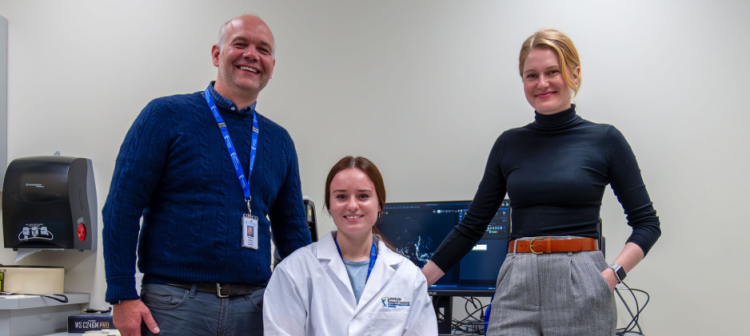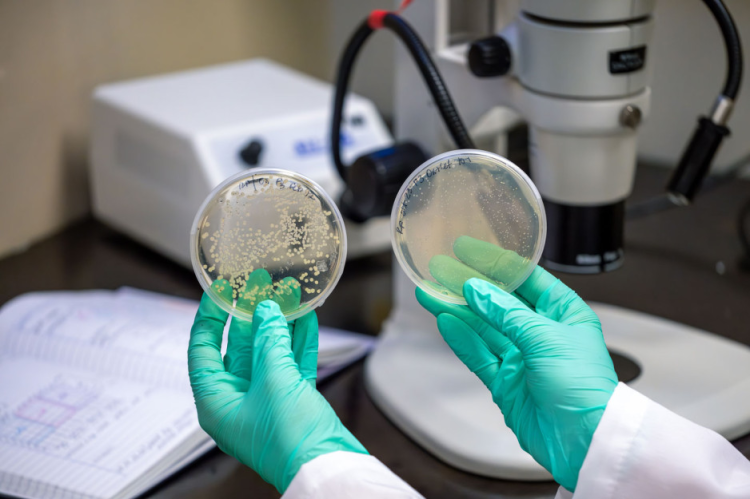Tucked in the back of the Microbiome and Probiotic Research Lab at St. Joseph's hospital sits the fly room - a small space that houses even smaller insects whose microscopic innards could hold clues into the link between antibiotic use and the formation of kidney stones.
Kidney stones are a growing problem, especially among women and young children.
Researchers at Schulich School of Medicine & Dentistry and St. Joseph's Health Care London's Lawson Research Institute have turned to an unlikely source - the humble fruit fly as helper, not house pest - to see whether oral antibiotic use is partly to blame. Previous research has shown people with kidney stones have an imbalance in the gut microbiome and a genetic footprint that could suggest resistance to antibiotics.
The question graduate student Riley Fidler is trying to solve: Is antibiotic use shifting microbiome balance and making otherwise healthy individuals more susceptible to kidney stones?
At the centre of her research is an unlikely research ally. No bigger than a sesame seed, fruit flies share about 70 per cent of their genes with humans - making the insects ideal stand-ins for genetic research into human diseases. This similarity is especially relevant in fruit flies' Malpighian tubules, or excretory organs, when compared to human nephrons, the functional unit of the kidneys.
If a fruit fly is the size of a sesame seed, their tubules are smaller than the hairs on a raspberry. And "kidney stones" within their tubules are even tinier.
It is exacting and exciting research, says Fidler, master of science candidate in the department of microbiology and immunology who is working alongside professor Jeremy Burton and postdoctoral researcher Kait Al.

The kidney research team (L to R) Schulich professor Jeremy Burton, Riley Fidler, master of science candidate in the department of microbiology and immunology and postdoctoral researcher Kait Al. (St. Joseph's Health Care London)
Fidler is fascinated by the human microbiome and its impact on health - from metabolism and stress to mental health, the ability to fight infection and even to prevent or overcome cancer.
"A lot of people view bacteria as dangerous agents, but I would suggest that we view the microbiome almost as our sidekick,'" said Fidler. "By maintaining good gut health, in turn, your gut microbiota will keep you healthier."
If the team can identify whether antibiotic use may be an underlying cause of kidney stones, prevention strategies to strengthen gut health could be used in tandem with an antibiotic to repair gut barrier integrity.
"Kidney stone disease has a high prevalence, high rate of recurrence and high pain. Finding the cause of the increased cases of kidney disease and knowing how to prevent stone-formation is critical for quality of life." - Riley Fidler, MSc candidate and researcher
Fidler's research looks at four antibiotics commonly prescribed to fight infections (both related and unrelated to kidney function) in people: cefazolin, ciprofloxacin, penicillin and sulfamethoxazole-trimethoprim.
Fidler places different fruit fly populations into containers with different antibiotics. Then she removes the insects' two pairs of tubules and examines them with birefringence microscopy, a technique that uses light and special filters to see things otherwise invisible to the naked eye. It allows her to see the microscopic kidney stones that grew within the tubules after the flies were supplemented with antibiotics. Computer software then quantifies the stone load.
The hope is, once researchers understand the correlation between antibiotics and the formation of kidney stones, this could promote antibiotic stewardship - fewer unnecessary antibiotic prescriptions - and lead to more targeted treatment strategies. For children specifically, this research could help practitioners know which antibiotic is best for children to avoid kidney stones.

Petri dishes containing the two main bacteria of the fruit fly - Lactobacillus and Acetobacter. (St. Joseph's Health Care London)
For Fidler, doing this research in a hospital-based setting is critical, as she seeks guidance from urologists. Burton also works closely with other researchers and clinicians at St. Joseph's in infectious diseases, urology and surgery to understand issues facing patients in clinical practice.
This knowledge directly improves the work being done in the Microbiome and Probiotic Lab.
"I love research because I use each result to determine what experiments I should perform next. In the end, I am able to communicate a story using all my results that can be tied together," said Fidler. "To produce good work and overcome the many challenges in research, you must be very passionate about what you do."











